
Carl Lee Perkins was an American guitarist, singer and songwriter. A rockabilly great and pioneer of rock and roll, he began his recording career at the Sun Studio, in Memphis, beginning in 1954. Among his best-known songs are "Blue Suede Shoes", "Honey Don't", "Matchbox" and "Everybody's Trying to Be My Baby".

Ned Washington was an American lyricist born in Scranton, Pennsylvania.

Johnny Cash at San Quentin is the 31st overall album and second live album by American singer-songwriter Johnny Cash, recorded live at San Quentin State Prison on February 24, 1969, and released on June 16 of that same year. The concert was filmed by Granada Television, produced and directed by Michael Darlow. The album was the second in Cash's conceptual series of live prison albums that also included At Folsom Prison (1968), På Österåker (1973), and A Concert Behind Prison Walls (1976).
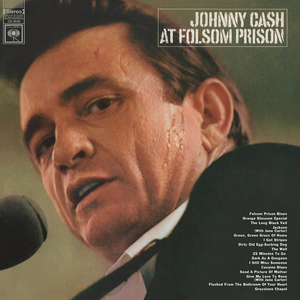
Johnny Cash at Folsom Prison is the first live album by American singer-songwriter Johnny Cash, released on Columbia Records on May 6, 1968. After his 1955 song "Folsom Prison Blues", Cash had been interested in recording a performance at a prison. His idea was put on hold until 1967, when personnel changes at Columbia Records put Bob Johnston in charge of producing Cash's material. Cash had recently controlled his drug abuse problems, and was looking to turn his career around after several years of limited commercial success. Backed by June Carter, Carl Perkins, and the Tennessee Three, Cash performed two shows at Folsom State Prison in California on January 13, 1968. The initial release of the album consists of fifteen songs from the first show and two from the second.

Boot Hill, or Boothill, is the generic name of many cemeteries, chiefly in the Western United States. During the 19th and early 20th century it was a common name for the burial grounds for paupers.
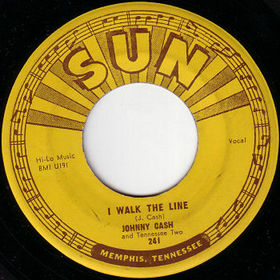
"I Walk the Line" is a song written and recorded in 1956 by Johnny Cash. After three attempts with moderate chart ratings, it became Cash's first #1 hit on the Billboard country chart, eventually reaching #17 on the Billboard Hot 100.
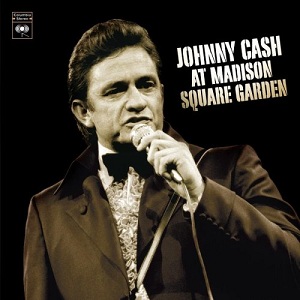
Johnny Cash at Madison Square Garden is a 1969 recording of a Johnny Cash concert at Madison Square Garden. It was released in 2002.

Ring of Fire: The Best of Johnny Cash is the sixteenth album by singer-songwriter Johnny Cash, released on Columbia Records in 1963. This album collects tracks from singles and an EP released between 1959 and 1963, Cash's first years on the Columbia label, and marked the first release of these tracks in LP format, with the exception of "I Still Miss Someone," which had previously appeared on the 1958 album The Fabulous Johnny Cash. "Ring of Fire", one of Cash's most famous tracks, made its first LP appearance here. Ring of Fire was the first #1 album when Billboard debuted their Country Album Chart on January 11, 1964. Certified Gold on February 11, 1965 by the RIAA, it earned him his first Gold LP. It stands as the only Columbia "greatest hits" collection to be included in the Johnny Cash: The Complete Columbia Album Collection box set.

Johnny Cash Sings the Ballads of the True West is a concept double album and the 22nd overall album released by country singer Johnny Cash, released on Columbia Records in 1965. Covering twenty individual songs, the album, as its title suggests, contains various ballads and other songs on topics related to the history of the American Old West. This includes Carl Perkins' "The Ballad of Boot Hill", "Streets of Laredo", and the sole single from the album, "Mr. Garfield", describing the shock of the population after the assassination of President James Garfield. One of the songs, "25 Minutes to Go", would later be performed at Folsom Prison and appear on Cash's famous At Folsom Prison recording in 1968, while the melody of "Streets of Laredo" would be recycled for the song "The Walls of a Prison" featured on Cash's album From Sea to Shining Sea.

From Sea to Shining Sea is a concept album and 26th album by country singer Johnny Cash, released on Columbia Records in 1968. Each track on the album was written by Cash; none of them were released as singles. The album was included on the Bear Family box set Come Along and Ride This Train.
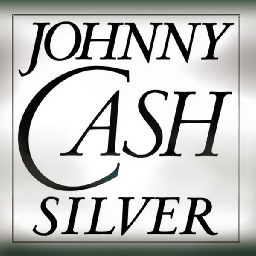
Silver is the 25th anniversary studio album by American country singer Johnny Cash, released on Columbia Records in 1979. It peaked at #28 on the Billboard albums chart. "(Ghost) Riders in the Sky" peaked at #2 on the singles chart; the two other singles, "Bull Rider" and "I'll Say It's True", had reached #66 and #42, respectively. Recordings of "Cocaine Blues" had previously appeared on At Folsom Prison and Now, There Was a Song!, under the title "Transfusion Blues" on the latter. The album was produced by Brian Ahern, who controversially introduced digital elements into the songs to the disapproval of some listeners. This is the last album that featured bassist Marshall Grant, longtime Cash collaborator in Tennessee Two. He departed from Cash's band the following year.

Johnny Cash på Österåker is a live album by country singer Johnny Cash released on Columbia Records in 1973, making it his 43rd overall release. The album features Cash's concert at the Österåker Prison in Sweden held on October 3, 1972. Its counterparts in concept are the more notable At Folsom Prison (1968), At San Quentin (1969), and A Concert Behind Prison Walls (1976). Unlike aforementioned, På Österåker does not contain any of Cash's most well-known songs; it does, however, include a version of Kris Kristofferson's "Me and Bobby McGee". "Orleans Parish Prison" was released as a single, faring rather poorly on the charts. Cash had previously recorded "I Saw a Man" for his 1959 album, Hymns by Johnny Cash.

The Johnny Cash Children's Album is the 49th album by country singer Johnny Cash, released on Columbia Records in 1975 featuring recordings made between January 1972 and October 1973. As the title implies, it contains songs written for children. Among others, this includes "Tiger Whitehead", a song later released in an acoustic version on Cash's posthumous Personal File album in 2006. Most of the songs on the album had not been performed by Cash before. "Old Shep" had been performed by Elvis Presley, among others. One track recorded in 1972 was previously released on LP: "I Got a Boy " was first made available on the 1972 album International Superstar. It is a tongue-in-cheek duet between Cash and his wife, June Carter Cash, about their son, John Carter Cash.
Paul Kennerley is an English singer-songwriter, musician, and record producer working in the American contemporary country music industry.
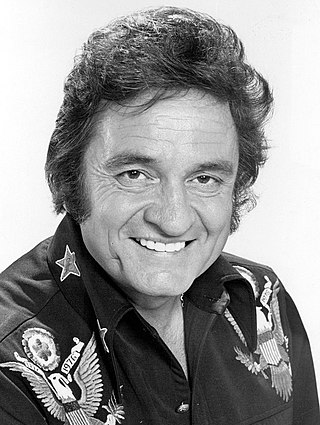
John R. Cash was an American singer-songwriter. Most of Cash's music contains themes of sorrow, moral tribulation, and redemption, especially songs from the later stages of his career. He was known for his deep, calm, bass-baritone voice, the distinctive sound of his backing band, the Tennessee Three, that was characterized by its train-like chugging guitar rhythms, a rebelliousness coupled with an increasingly somber and humble demeanor, and his free prison concerts. Cash wore a trademark all-black stage wardrobe, which earned him the nickname "Man in Black".

"Daddy Sang Bass" is a song written by Carl Perkins, with lines from the chorus of "Will the Circle Be Unbroken?", and recorded by American country music singer Johnny Cash. It was released in November 1968 as the first single from the album The Holy Land. The song was Cash's sixty-first release on the country chart, going on to No. 1 on the Billboard country chart for 6 weeks and spending a total of 19 weeks there. The single reached No. 56 on the Cashbox pop singles chart in 1969. "Daddy Sang Bass" was also released on the Columbia Records Hall of Fame Series as a 45, #13-33153, b/w "Folsom Prison Blues". The record was nominated in the CMA awards category of Single of the Year by the Country Music Association (CMA) in 1969.

"Big Iron" is a country ballad song written and performed by Marty Robbins. Originally released as an album track on Gunfighter Ballads and Trail Songs in September 1959, it was released as a single in February 1960 with the song "Saddle Tramp" as the B-side single. In 2010, members of the Western Writers of America chose it as the 11th best Western song of all time.
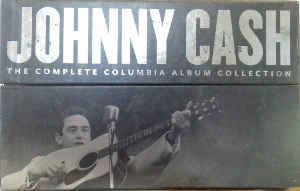
The Complete Columbia Album Collection is a box set by country singer Johnny Cash, released posthumously in 2012 on Columbia Records and Legacy Recordings.
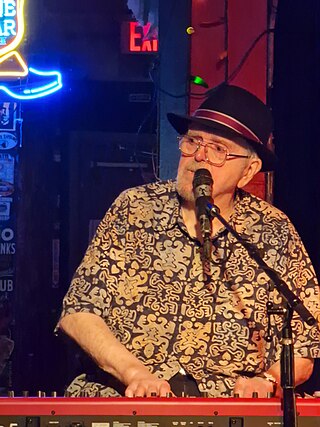
Earl Poole Ball Jr. is an American singer-songwriter, pianist, music producer and actor. His musical work spans the Ameripolitan, Country, Americana and Rockabilly genres. He has performed with many well known American musicians, including Buck Owens & The Buckaroos, Gram Parsons, Carl Perkins, Merle Haggard, Freddie Hart, Marty Stuart, Phil Ochs, Michael Nesmith, Marty Robbins, Wynn Stewart, The Flying Burrito Brothers and The Byrds. He is best known for his 20 years spent touring and recording with Johnny Cash. (1977-1997)
"Brother" is a song by the American rock band Alice in Chains and the opening track on their 1992 acoustic EP Sap. The song was written by guitarist and vocalist Jerry Cantrell for his younger brother, David. Cantrell sings lead vocals in the song, while Heart lead vocalist Ann Wilson sings backing vocals. An acoustic version performed on Alice in Chains' MTV Unplugged in 1996 was released in a live album and DVD. The song was included on the compilation albums Music Bank (1999) and The Essential Alice in Chains (2006).



















